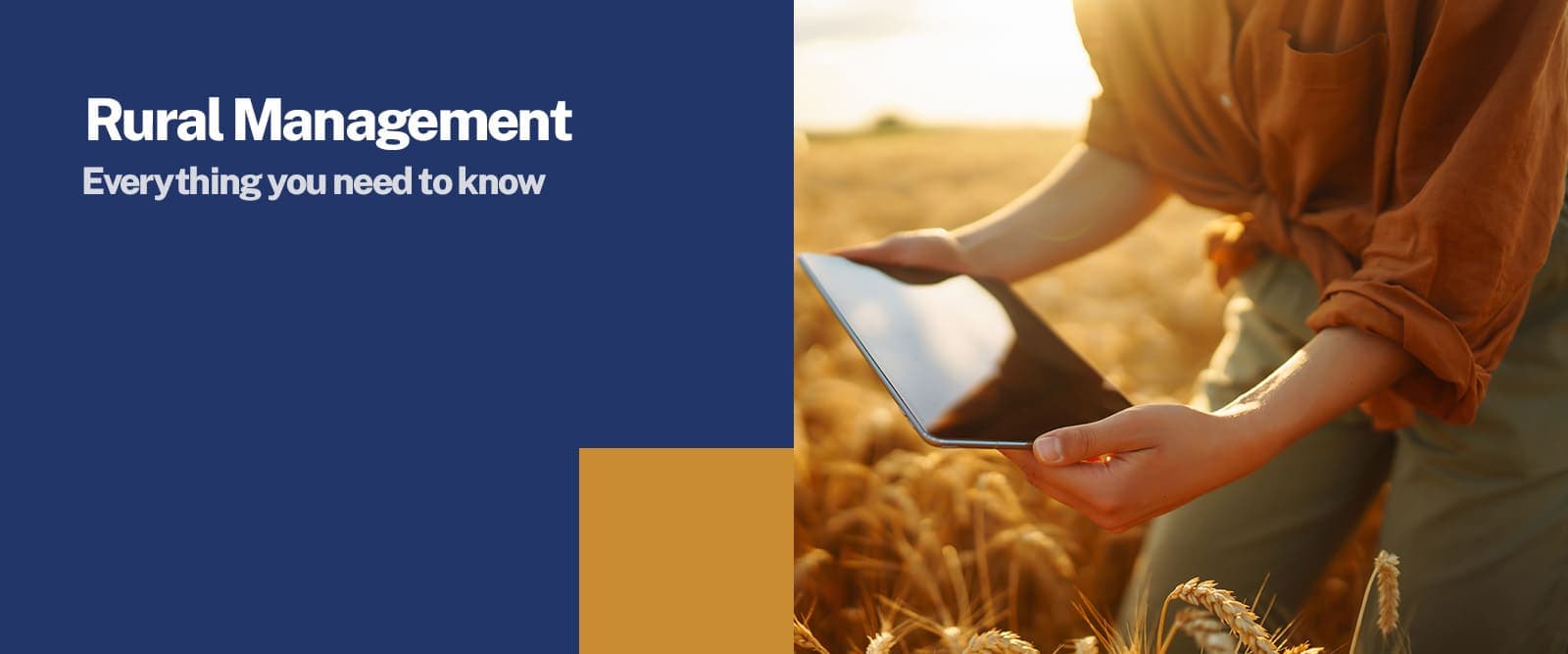5800 students unlocked their dream jobs with UG/PG programs in top colleges. Apply Now!
In a world where progress often focuses on urban landscapes, the need for effective rural management becomes increasingly crucial. If you've ever wondered how you can make a meaningful difference while honing your business knowledge, this path might just be the one for you. An MBA degree in Rural Management is not just about numbers and spreadsheets; it is about connecting with communities, embracing diversity, and making a noticeable difference in the lives of people who deserve equal opportunities.
If you have a passion for making a difference and want to contribute to the development of rural areas, this specialised field holds tremendous promise and opportunities for growth.
What is Rural Management?
- Rural management refers to the application of management principles, strategies, and practices to address the specific challenges and opportunities presented in rural areas.
- It involves the effective and sustainable management of resources, institutions, and organisations in rural settings to promote economic growth, social development, and environmental sustainability.
- The concept of rural management revolves around applying management principles and practices in rural settings to address the unique challenges and opportunities found in these areas.
- As a rural development manager, you will be responsible for planning, implementing, and overseeing initiatives aimed at promoting the development and improvement of rural areas.
- The primary responsibility of a rural development manager is to drive sustainable growth, address the specific needs of rural communities, and uplift the socio-economic conditions of rural populations.
What is MBA in Rural Management?
- Master of business administration or MBA in Rural Management is a two-year postgraduate program with average fees ranging anywhere from ₹ 5000 - ₹5,00,000.
- This MBA program is for students who are interested in who have a keen interest in rural development, sustainable agriculture, social entrepreneurship, and making a positive impact in rural communities.
- The main objective of this MBA degree is to equip students with the knowledge, skills, and tools necessary to manage and drive sustainable development in rural areas.
- There are several reasons to do MBA specialising in rural management, one such is that it emphasises the development of leadership, strategic thinking, problem-solving, and project management skills specific to rural settings.
- The future scope of an MBA in Rural Management is promising, given the increasing focus on rural development, sustainability, and inclusive growth.
Eligibility for MBA in Rural Management
- Students are first required to complete their high school education with a minimum of 50% marks from any stream.
- While applying for the top MBA colleges in India, students are then required to score a minimum of 60% in their bachelor’s programs. There is a 5% relaxation for students of the reserved category.
- You will be required to give MBA entrance exams for admission, followed by group discussions and personal interviews.
Syllabus for MBA in Rural Management
MBA in Rural Management syllabus is divided into six semesters, involving theoretical as well practical subjects for a better understanding of the course. Given below is the table of the rural management course:
|
Semester I |
Semester II |
|
Essentials of Management |
Financial Management |
|
Quantitative Methods in Business |
Research Methodology |
|
Human Resource Management |
E-Commerce |
|
Managerial Economics |
Indian Financial System |
|
Computer Applications & MIS |
Management of NGOs & Action Research |
|
Rural Society and Institutions |
Rural Development: Concepts, Models and Programs |
|
Management of Social Empowerment |
Management of Sustainable Agriculture |
|
Financial & Managerial Accounting |
Rural Markets and Marketing Management |
|
Semester III |
Semester IV |
|
Business Laws |
Organisational Effectiveness & Change |
|
Environment and Natural Resource Management |
Strategies for Sustainable Rural Development |
|
Energy Requirement in Agriculture & its Management |
Industry and Agri-Business |
|
Management of Animal Husbandry, Dairying & Aquaculture |
Rural Infrastructure |
|
Watershed Management |
High Tech Horticulture |
|
Global Business Environment & Rural Management |
Precisions Farming |
Jobs after MBA in Rural Management
|
Job Role |
Job Description |
Average Salary |
|
Agricultural Specialist |
You will be responsible for providing consultancy services to farmers, agricultural cooperatives, or agribusinesses, helping them optimise their agricultural practices. |
₹ 3-4 LPA |
|
Research officer |
You will be responsible for collecting information related to management in rural areas and providing solutions for the same. |
₹ 3-4 LPA |
|
Project Manager |
You will be responsible for overseeing and coordinating projects related to rural management. |
₹ 5 LPA |
|
Rural Finance Manager |
You will be responsible for assessing credit needs, managing loan portfolios, promoting savings initiatives, and providing financial literacy training. |
₹ 7.5 LPA |
|
Rural Development Manager |
You will be responsible for coordinating initiatives related to rural areas. |
₹ 9 LPA |
|
Rural Supply Chain Manager |
You will be responsible for optimising logistics, distribution, and procurement processes in the rural context. |
₹ 16 LPA |
|
Rural Marketing Manager |
You will be responsible for understanding rural market dynamics, developing marketing strategies, and implementing targeted campaigns to reach and engage rural consumers. |
₹ 17.5 LPA |
Areas of Recruitment for MBA in Rural Management
After the completion of an MBA in Rural Management, graduates can explore various sectors and organisations that offer recruitment opportunities aligned with their specialized knowledge and skills.
Here are some key areas where recruitment for MBA in Rural Management graduates can occur:
Government Agencies: Agencies at the national, state, and local levels often recruit professionals with expertise in rural management. Graduates can work in roles such as rural development officer, project manager, policy analyst, or program coordinator.
Non-Governmental Organisations: NGOs working in areas such as livelihood promotion, agriculture, education, health, and community development frequently hire MBA graduates in rural management. They play a significant role in rural development and are actively engaged in addressing rural challenges.
Agri-business and Rural Marketing: Agribusinesses, rural-focused companies, and organisations involved in agricultural value chains seek MBA graduates in rural management. The roles involve understanding the rural market dynamics, designing marketing strategies, and developing sustainable business models tailored to rural contexts.
Research and Consultancy: Research institutions and consultancy firms working in the field of rural development hire MBA graduates in rural management to conduct research, analysis, and policy advisory services.
Conclusion
As we conclude our exploration of an MBA in Rural Management, it becomes evident that this specialised degree holds immense promise and potential. With your dedication and the skills you acquire through this program, you have the power to weave new narratives, cultivate sustainable growth, and create a world where rural communities thrive.
With Sunstone, students can learn occupational skills with the help of training courses. Students are benefited from 70+ training sessions from expert guest faculty (ex-IIMs, IITs). Along with this, students can get hands-on experience from capstone projects, which can help secure job offers.
FAQs - MBA Rural Management
Is rural management a good career?
Yes, rural management is a good career offering several job opportunities as well as helping in student's advancement and growth.
What can I do after my MBA in Rural Management?
There are a number of job opportunities for students after an MBA in Rural Management. While few can also opt for higher education, such as a PhD.
Can I get an MBA degree after the 12th?
You need to first pursue undergraduate courses in any discipline from a recognised university, and then you can pursue an MBA program.
Can I pursue an MBA degree without an entrance exam?
Yes, few universities take admissions for MBA programs based on a student's performance in his/her bachelor’s degree.
Is there any age limit for MBA programs?
No, there are no age restrictions for students to pursue MBA programs.
Can I pursue MBA programs from colleges powered by Sunstone?
Yes, you can pursue MBA courses from colleges powered by Sunstone. Some of the top colleges are:
- Atlas Ideal International College
- Ajeenkya DY Patil University
- GD Goenka University
- Bangalore Institute of Management Studies
- SAGE University
HELP
Take the first step towards your dream job.
ABOUT THE AUTHOR

